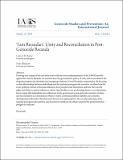Files in this item
"I am Rwandan" : unity and reconciliation in post-genocide Rwanda
Item metadata
| dc.contributor.author | Blackie, Laura E. R. | |
| dc.contributor.author | Hitchcott, Nicki | |
| dc.date.accessioned | 2018-06-20T10:30:05Z | |
| dc.date.available | 2018-06-20T10:30:05Z | |
| dc.date.issued | 2018-06-20 | |
| dc.identifier | 251361574 | |
| dc.identifier | 8edfbc8c-8906-43af-9f13-5a0f9ac1b855 | |
| dc.identifier.citation | Blackie , L E R & Hitchcott , N 2018 , ' "I am Rwandan" : unity and reconciliation in post-genocide Rwanda ' , Genocide Studies and Prevention , vol. 12 , no. 1 , 5 , pp. 24-37 . https://doi.org/10.5038/1911-9933.12.1.1480 | en |
| dc.identifier.issn | 1911-0359 | |
| dc.identifier.uri | https://hdl.handle.net/10023/14311 | |
| dc.description | This publication was made possible through the support of a research grant AH/M004155/2 from the Arts and Humanities Research Council, UK. The research was conducted in collaboration with the Aegis Trust who granted Professor Nicki Hitchcott and her team access to oral testimonies stored in the Genocide Archive of Rwanda. | en |
| dc.description.abstract | Drawing on a corpus of ten oral interviews with survivors and perpetrators of the 1994 Genocide against the Tutsi in Rwanda, we examine how the government’s policy of unity and reconciliation has shaped post-genocide identities and intergroup relations in local Rwandan communities. By focusing on the relationships between individuals and the national post-genocide narrative, we show how the socio-political context in Rwanda influences how people locate themselves and how they ascribe rights and duties to and in relation to others. Specifically, we use positioning theory as an interpretive lens to argue that individuals view adherence to the government’s post-genocide narrative of unity and reconciliation as a moral duty, which is vital to continued political stability and economic development in Rwanda. Our discussion focuses on explaining how the social positioning of the national post-genocide narrative may function to reinforce the ethnic tensions the government has pledged to eradicate. | |
| dc.format.extent | 467658 | |
| dc.language.iso | eng | |
| dc.relation.ispartof | Genocide Studies and Prevention | en |
| dc.subject | Rwanda | en |
| dc.subject | Genocide against the Tutsi | en |
| dc.subject | Unity and reconciliation | en |
| dc.subject | Positioning theory | en |
| dc.subject | Ndi umunyarwanda | en |
| dc.subject | DT Africa | en |
| dc.subject | JZ International relations | en |
| dc.subject | T-NDAS | en |
| dc.subject | BDC | en |
| dc.subject | SDG 8 - Decent Work and Economic Growth | en |
| dc.subject | SDG 16 - Peace, Justice and Strong Institutions | en |
| dc.subject.lcc | DT | en |
| dc.subject.lcc | JZ | en |
| dc.title | "I am Rwandan" : unity and reconciliation in post-genocide Rwanda | en |
| dc.type | Journal article | en |
| dc.contributor.sponsor | Arts and Humanities Research Council | en |
| dc.contributor.institution | University of St Andrews. French | en |
| dc.identifier.doi | https://doi.org/10.5038/1911-9933.12.1.1480 | |
| dc.description.status | Peer reviewed | en |
| dc.identifier.url | http://scholarcommons.usf.edu/gsp/vol12/iss1/5/ | en |
| dc.identifier.grantnumber | AH/M004155/2 | en |
This item appears in the following Collection(s)
Items in the St Andrews Research Repository are protected by copyright, with all rights reserved, unless otherwise indicated.

